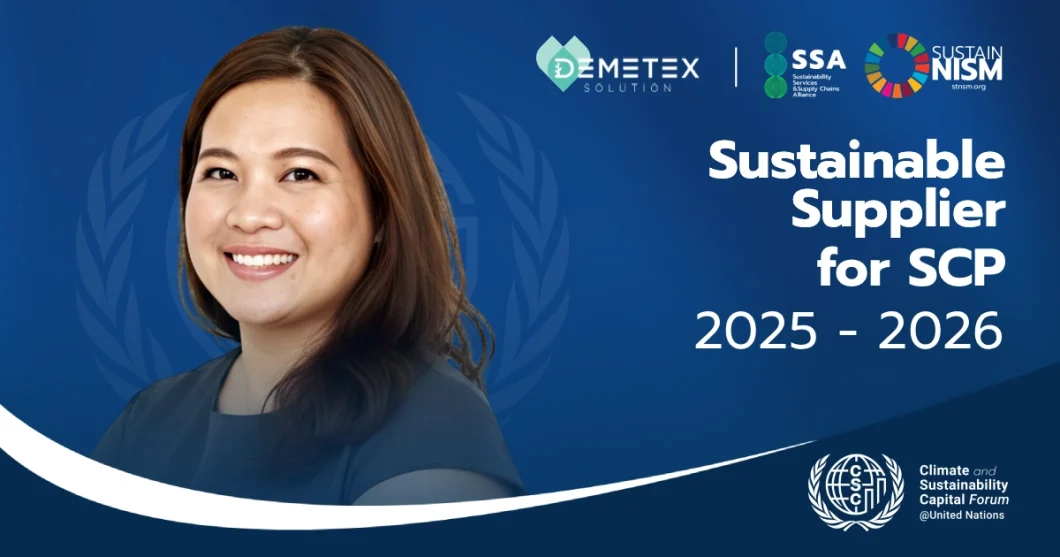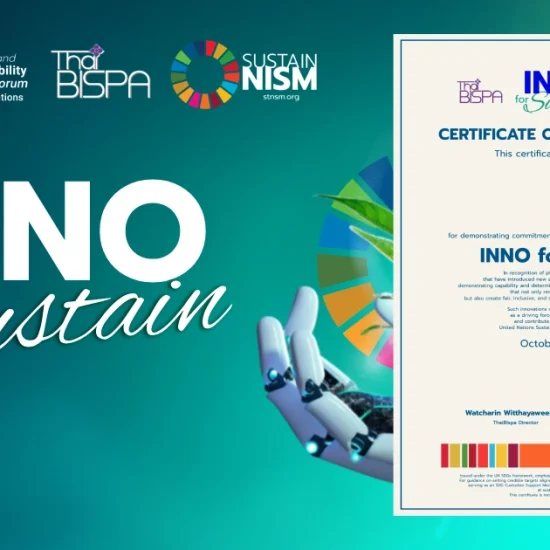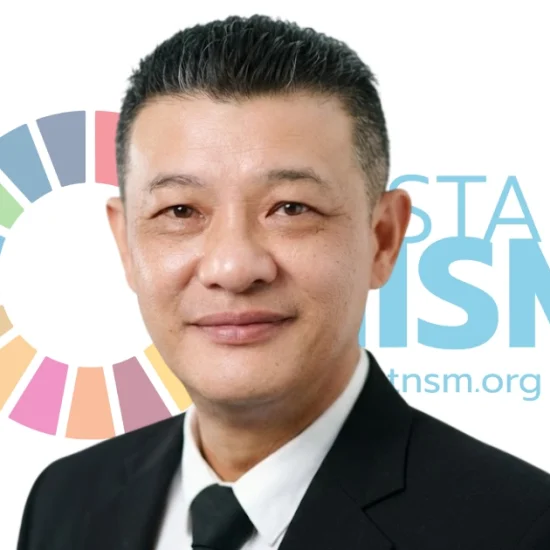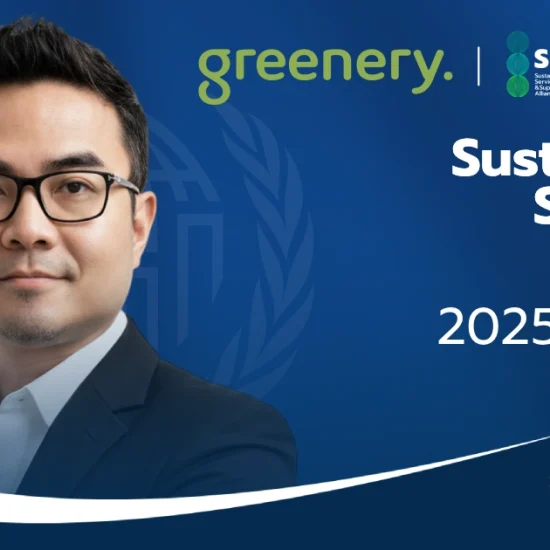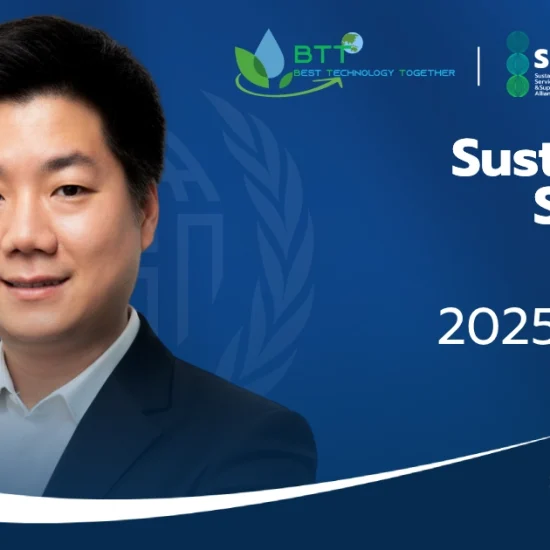This certifies the official recognition of Demetex (as part of Demetex Solution Co., Ltd.) as a Sustainable Supplier under the CSCAP–SSA (Sustainability Services & Supply Chains Alliance) Framework for 2025–2026.
Table of Contents
Dimension 1: Policy
- Introduction
- Company Sustainability Policy and Mission Statement
Dimension 2: Goals
- Recognized Products and Services
- Alignment with the Sustainable Development Goals (SDGs)
- Quantitative and Qualitative Impact Outcomes (Key Performance Indicators)
Dimension 3: Sustainability Delivery Process
- Operational and Sustainability Implementation Process
- ESG Relevance and Supply Chain Integration
- Purchaser Impact Note Claim Process
Dimension 1: Policy
Introduction
This document serves as a reference for sustainability-oriented purchasers, providing verified data on DEMETEX Solution Co., Ltd.’s sustainability performance. Buyers can integrate these impact contributions into their SSA “Impact Note,” procurement disclosures, and ESG reports. Where a purchase of DEMETEX’s products or services demonstrably supports progress toward the Sustainable Development Goals (SDGs), the buyer is encouraged to seek recognition as a “Sustainable Buyer” under the CSCAP–SSA framework.
DEMETEX Solution Co., Ltd. has been recognized in the 2025–2026 cycle of the CSCAP–SSA (Sustainability Services & Supply Chains Alliance) as a Sustainable Supplier. This regional UN-associated platform—coordinated via the Sustainism Initiative in partnership with AFMA (an intergovernmental body established by UN ESCAP and FAO) and UN ESCAP—aims to build inclusive, resilient, and sustainability-aligned procurement ecosystems across Asia and the Pacific.
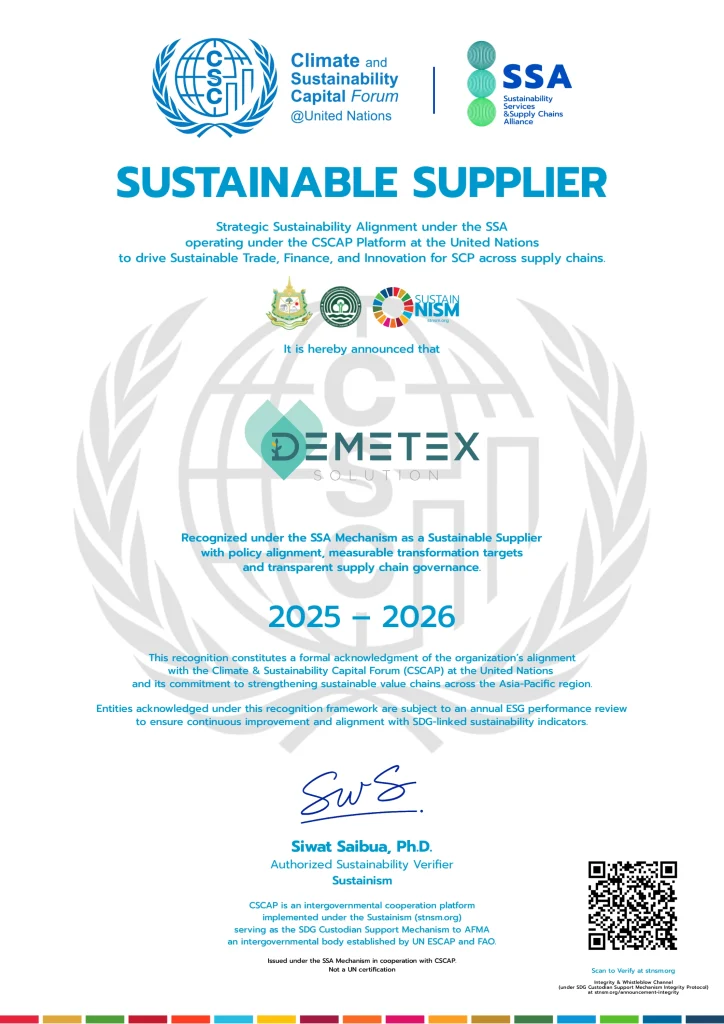
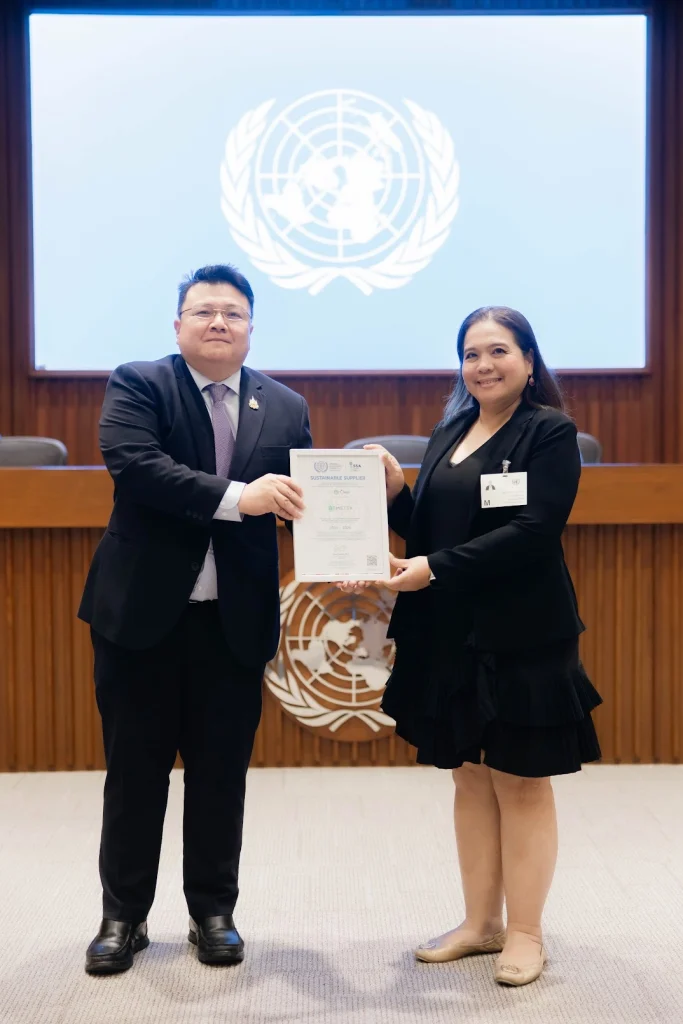
As a biotechnology innovator, DEMETEX’s core mission is to empower individuals to monitor key biological health indicators through affordable and user-friendly diagnostic technologies. Its business model is designed to generate shared value across both environmental and social dimensions. Products and services are tailored to enhance public health and quality of life, while also reducing inequities in access to preventive healthcare—particularly among vulnerable populations in rural communities.
Company Sustainability Policy and Mission Statement
DEMETEX is guided by a vision to integrate biotechnology with sustainable improvements in human well-being. The company operates under the principle:
“Biomarker Innovations for Better Lives”
Its core mission is to equip individuals with the tools and knowledge to take ownership of their own health and well-being through accessible, easy-to-use technologies. DEMETEX enables people to regularly monitor key biological indicators in their own bodies, thereby empowering them to prevent illness and improve their quality of life on a daily basis.
While DEMETEX initially gained recognition for its development of a rapid blood test for pesticide residues, the company has continued to expand its research portfolio, working toward additional biomarker-based diagnostics that address a broader range of health risks and environmental exposures. Its innovation approach is rooted in real-world health challenges, with careful consideration given to both environmental and social impacts throughout the product lifecycle and operational processes.
Note: DEMETEX’s business conduct reflects strong alignment with international labor and human rights standards, including core conventions of the International Labour Organization (ILO). The company emphasizes a safe, inclusive, and dignified working environment for all personnel involved in its operations and supply chain.
Dimension 2: Goals
Recognized Products or Services
DEMETEX delivers a portfolio of biotechnology-driven services that proactively address public health risks—particularly those linked to environmental and occupational chemical exposure. Each offering is engineered to tackle critical health challenges while delivering measurable social impact and aligning with key Sustainable Development Goals (SDGs). The following product has been formally recognized under the SSA sustainability framework:
DR. EX Pesticide Residue Screening Kit
This biotechnology innovation enables rapid blood screening to detect pesticide exposure in individuals, targeting farmers and agricultural communities most vulnerable to toxic buildup. The test identifies specific pesticide-related biomarkers in blood samples, allowing users to detect contamination at the earliest stage with high analytical accuracy.
Timely and reliable results empower individuals to assess their health risks and take preventive action before chronic illness develops. By fostering informed behavior change—such as safer pesticide handling and reduced use—this tool supports early intervention and helps prevent pesticide-related illnesses, thereby strengthening community health resilience.
Alignment with the Sustainable Development Goals (SDGs)
DEMETEX recognizes its strategic role in advancing the United Nations Sustainable Development Goals, with a core focus on SDG 3: Good Health and Well-Being. The company’s innovation strategy, service model, and community outreach efforts are directly aligned with specific SDG 3 targets and indicators as follows:
- Target 3.9 – Substantially reduce the number of deaths and illnesses from hazardous chemicals and pollution
Indicator 3.9.3 – Mortality rate attributed to unintentional poisoning
DEMETEX’s DR. EX blood screening tool supports progress toward this target by detecting early signs of pesticide toxicity. Early detection enables timely preventive actions, helping reduce the risk of chronic pesticide poisoning and associated mortality. - Target 3.8 – Achieve universal health coverage, including access to essential health-care services
Indicator 3.8.1 – Coverage of essential health services
Through mobile screening in rural communities with little or no access to preventive healthcare, DEMETEX delivers essential diagnostic services to underserved populations. This approach contributes to more equitable health system coverage and supports progress toward universal health coverage as reflected in Indicator 3.8.1. - Target 3.d – Strengthen the capacity for early warning, risk reduction, and management of national and global health risks
DEMETEX strengthens local early-warning and health risk management capacity by equipping frontline communities with diagnostic tools and knowledge. This empowers people to proactively detect and mitigate chemical exposure risks, directly supporting the intent of Target 3.d.
In addition to SDG 3, DEMETEX’s operations contribute to other related goals, including:
- SDG 8 – Decent Work and Economic Growth: Supports Target 8.8 by promoting safe working conditions for agricultural workers through pesticide safety education and exposure risk screening programs.
- SDG 9 – Industry, Innovation and Infrastructure: Contributes to domestic innovation capacity through sustained investment in biotechnology research and development (Targets 9.5 and 9.b).
- SDG 10 – Reduced Inequalities: Addresses Target 10.2 by expanding access to health services for low-income and remote rural communities, thereby promoting greater inclusion in healthcare.
These alignments are put into practice across DEMETEX’s products, research initiatives, and field-based health interventions. All activities are designed to generate measurable public health outcomes and to contribute to national and global SDG progress.
Quantitative and Qualitative Impact Outcomes (Key Performance Indicators – per 200 individuals screened)
DEMETEX’s operations are firmly aligned with the UN Sustainable Development Goals, particularly SDG 3 – Good Health and Well-Being. The company’s solutions are designed to help reduce health risks from toxic chemical exposure (Target 3.9) and to expand access to preventive care in underserved populations (Target 3.8). These contributions are implemented through evidence-based tools, community programs, and transparent monitoring.
The following table outlines DEMETEX’s measurable impact outcomes, emphasizing contributions toward SDG 3 while also supporting SDGs 8, 9, 10, 12, and 17. All outcomes are based on pilot implementations and are scaled per 200 individuals screened.
| SDG Goal | Target | Indicator | Relevance to DEMETEX | Measured Outcomes (per 200 screened) |
|---|---|---|---|---|
| SDG 3 – Good Health and Well-Being | 3.9 – Substantially reduce deaths and illnesses from hazardous chemicals and pollution | 3.9.3 – Mortality rate attributed to unintentional poisoning | Blood screening for pesticide exposure allows early detection and intervention for individuals at risk of chemical poisoning. This helps prevent long-term toxic buildup and enables timely referral to care. | ~10 individuals (per 200) identified with high-risk pesticide levels; all receive health risk alerts and are enrolled in follow-up care or behavior-change programs. |
| SDG 3 – Good Health and Well-Being | 3.8 – Achieve universal health coverage (UHC), including access to essential services | 3.8.1 – Coverage of essential health services | Mobile screening in rural communities that lack preventive care services promotes early detection and health education in high-risk populations, extending essential services to underserved areas. | 100% of participants received screening within their own community; prior to DEMETEX’s program, such services were virtually unavailable in these areas. |
| SDG 8 – Decent Work and Economic Growth | 8.8 – Promote safe and secure working environments for all | 8.8.1 – Occupational injury rate per 100,000 workers | DEMETEX’s education and screening programs encourage the use of personal protective equipment (PPE) and safer agrochemical handling practices among farmers, reducing occupational health risks. | ≥70% of participants adopted improved PPE usage or safer pesticide handling practices. |
| SDG 9 – Industry, Innovation and Infrastructure | 9.5 – Enhance scientific R&D and innovation workforce | 9.5.2 – Researchers per million people | As a biotech startup, DEMETEX invests in in-house R&D and employs young scientists to develop innovative diagnostics for public health. | 1 R&D position created per 200 screenings; innovation recognized through national R&D awards. |
| SDG 10 – Reduced Inequalities | 10.2 – Promote universal social, economic & political inclusion | 10.2.1 – Proportion of people living below 50% of median income | Mobile deployment brings essential diagnostics to low-income, remote rural households, ensuring these vulnerable groups are not left behind in basic health service access. | 100% coverage of the targeted vulnerable population; effectively removed transportation and cost barriers to care for participants. |
| SDG 12 – Responsible Consumption and Production | 12.4 – Environmentally sound management of chemicals and wastes | 12.4.2 – Hazardous waste treated (safe treatment proportion) | Test kits adhere to ISO 13485 standards; all bio-sample waste is handled via certified medical waste protocols, preventing environmental contamination. | 0% of diagnostic waste is disposed unsafely; 100% is processed through proper certified biomedical waste channels. |
| SDG 17 – Partnerships for the Goals | 17.17 – Encourage effective multi-stakeholder partnerships | 17.17.1 – Number of formal multi-stakeholder partnerships | DEMETEX co-implements projects with rural hospitals, farmer cooperatives, and research sponsors to broaden impact through collaboration. | ~3 formal collaborations per project (e.g. with health agencies, agricultural groups, and funding partners). |
Reference Notes
- Future Updates: Outcome figures will be updated with live field monitoring data as the program expands.
- Assumptions: Approximately 5% of the population screened shows high pesticide exposure; 70–80% of participants adopt improved safety measures after screening; prior to the program, access to any health screening in the target communities was nearly 0%.
Dimension 3: Sustainability Delivery Process
Operational and Sustainability Implementation Process
DEMETEX integrates sustainability into its core operations through a circular, preventive health delivery model tailored to rural agricultural communities. The operational process includes:
- Field-based service deployment through coordination with local health workers, enabling mobile blood screening directly in farming villages.
- Targeted community outreach based on regional pesticide exposure patterns and seasonal farming cycles.
- Risk-specific diagnostics using biomarker-based rapid test kits produced under ISO 13485-compliant manufacturing and QA systems.
- Data-driven behavior change support, whereby test results are used to guide health consultations, PPE adoption, and safe chemical handling.
Sustainability principles are embedded at each stage—ranging from R&D through waste management—to ensure that the company’s activities contribute to public health outcomes while minimizing environmental impact. This implementation model aligns with SCP (sustainable consumption and production) as articulated in SDG 12.4 and 12.5, and also reflects WHO recommendations on environmental health interventions in low-resource settings.
Note: The implementation process prioritizes human-centered design and equitable access, especially among socioeconomically vulnerable populations. This is consistent with the “Leave No One Behind” principle of the 2030 Agenda for Sustainable Development.
ESG Relevance and Supply Chain Integration
DEMETEX’s product and service ecosystem supports core Environmental, Social, and Governance (ESG) dimensions relevant to impact-oriented procurement:
- Environmental (E):
- Reduces long-term soil and water contamination risks through education and early detection of agrochemical misuse.
- Adheres to safe chemical use and waste disposal protocols in test kit production and disposal (ISO 13485 and biohazard standards).
- Social (S):
- Promotes rural health equity and worker safety, particularly for informal or unregistered agricultural laborers.
- Enhances community-level health literacy and risk awareness through integrated screening and consultation services.
- Governance (G):
- Ensures transparency in impact tracking via SSA-issued Impact Notes and public reporting.
- Maintains labor rights and ethical procurement compliance in line with ILO conventions and domestic labor regulations.
Supply chain integration includes upstream sourcing of diagnostic components from certified biomedical suppliers and downstream distribution via verified local public health partners. DEMETEX also commits to inclusive supplier engagement, with particular attention to domestic SMEs and women-led medical logistics teams, where applicable.
The ESG contributions from DEMETEX’s service delivery model provide measurable benefits that can be claimed by sustainability-aligned purchasers in their own ESG or CSR disclosures.
1. Purchaser Impact Note Process (4 Steps)
- Purchase: Complete your purchase of Demetex Solution Co., Ltd. products or services through an authorized distributor.
- Submit Proof: After receiving the goods or services in full, send the required documents to impactnote@stnsm.org.
- Review and Record: The CSCAP–SSA Secretariat reviews all submitted information for completeness and records the purchase in the Sustainism Registry.
- Receive Impact Note: The purchaser receives a unique Impact Note ID (e.g. SSA-IN-2025-XXXX), confirming that the transaction has been officially documented within the CSCAP–SSA system.
2. Purchaser Submission Requirements
Include a concise table summarizing the documents required for submission:
| Item | Details Required |
|---|---|
| Purchase invoice or receipt | Show product quantity and date of purchase |
| Delivery confirmation | Proof of goods or service completion (delivery note or photo) |
| Purchaser contact information | Full name, position, phone number, and e-mail address of the purchaser |
3. Claimable Outcomes (Organized by ESG Materiality Themes)
Reorganize the quantitative impact data into six ESG material themes for easier disclosure alignment with major sustainability frameworks:
| Material Theme | Impact Description | Estimated Outcome (per 200 participants) | Relevant SDGs |
|---|---|---|---|
| Occupational Health & Safety | Screening for pesticide-related biomarkers helps identify undetected toxic exposure among agricultural workers, reducing health risks. | ~10 individuals identified with high-risk exposure; all referred for preventive follow-up. | SDG 3.9 (3.9.3), SDG 8.8 (8.8.1) |
| Health Access & Equity | Mobile diagnostics reach rural, underserved communities with limited access to preventive care. | 100% of participants received free, on-site blood testing in their village. | SDG 3.8 (3.8.1), SDG 10.2 (10.2.1) |
| Chemical Management & Safety | Greater awareness after screening leads to reduction in excessive or unsafe pesticide use. | ≥70% of participants improved PPE usage or adjusted chemical handling practices. | SDG 12.4 (12.4.2), SDG 8.8 (8.8.1) |
| Health Literacy & Risk Awareness | Each screening event includes education on chemical safety and personal protection. | All participants received verbal and written counseling on protecting themselves from chemical exposure. | SDG 4.7, SDG 3.d |
| Responsible Procurement (Buyer) | Buyers can claim contributions to public health and rural safety by sourcing certified kits/services from DEMETEX. | Traceable impact claims via SSA-issued Impact Notes, aligning with national SDG strategies. | SDG 12.6, SDG 17.17 |
| Safe Medical Waste Handling | All biological waste from screenings is managed under ISO 13485-compliant protocols. | 0% of diagnostic waste improperly disposed; 100% channeled through certified biomedical waste treatment. | SDG 12.4 (12.4.2) |
4. Impact Note Claim Period
Impact Notes may be requested and recorded within 30 days from the date the purchaser has received the goods or services in full. Submissions received after this period may be reviewed in the following reporting cycle under the CSCAP–SSA Mechanism.
Important Disclaimer
This document is issued under the SDG Custodian Support Mechanism for the purpose of sustainability reference and transparency. It does not constitute an official endorsement or certification by the United Nations (UN).
The information contained herein is based on data publicly disclosed by the company and has not been independently verified or certified by Sustainism. Accordingly, it carries no legal effect or binding recognition under any formal certification system.
Any concerns regarding inaccuracies, misrepresentation, or conduct that may constitute SDG or Greenwashing violations should be reported confidentially via: whistleblower@stnsm.org
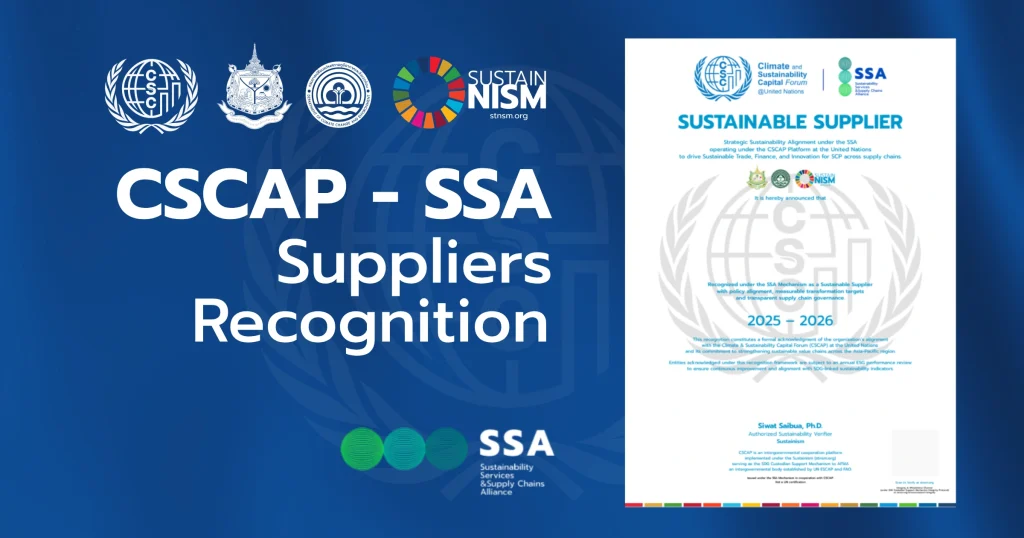
Siwat Saibua, Ph.D.
Authorize Sustainability Verifier
Sustainism Initiative (stnsm.org)
Sustainability@stnsm.org
Contact in Thailand (Coordinator and Operations)
O2OESG
Mr. Pornpot Chaovirakij
Director, O2OESG for CSCAP-SSA
+66 9703 44225
Contact at Sustainism Secretariat
Sustainism Initiatives
Ms. Kaninchita Wonganawat
Assistant Director of the Secretariat
+66 8298 96869
secretariat@stnsm.org


